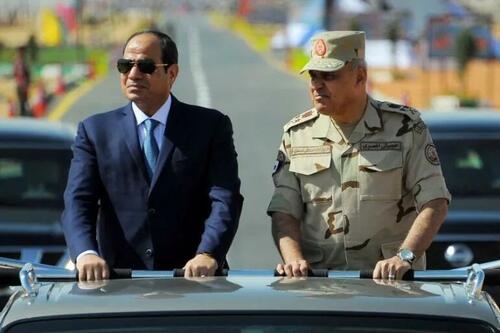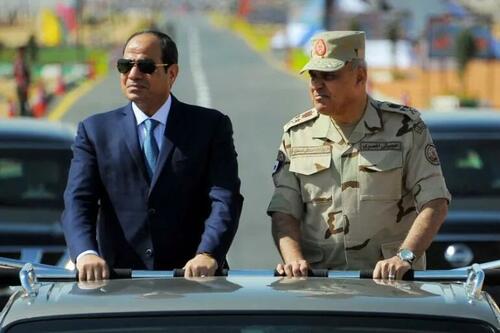America’s Own Assad: Egypt Under Sisi Has 70,000 Political Prisoners
As this year comes to an end, the most populous Arab country remains a stagnant mammoth with a slowly rotting political order, lacking domestic legitimacy and kept alive only by a continuous lifeline of cash from the West and Arab Gulf states who fear the repercussions of the Egyptian regime’s implosion.
The year started with Abdel Fattah el-Sisi, who is now 70, renewing his presidential term until 2030 after an electoral circus whose outcome was determined from the start. His only serious competition, former parliamentarian Ahmed Tantawi, was swiftly jailed.
Egypt’s secret police, Homeland Security, continued throughout the year targeting all forms and shades of dissent, both online and offline, keeping citizens incarcerated in an endless labyrinth of fabricated cases, dubbed by rights lawyers as a process of “rotation”.

Prison conditions remain draconian, and detainees have repeatedly gone on hunger strikes to protest torture and maltreatment. More than 50 incarcerated people have died in interior ministry-run prisons, Homeland Security branches and police stations this year.
Criticism of the president or regime officials in the mainstream media is virtually non-existent. Most media outlets are officially owned and micromanaged by one company created by the General Intelligence Service (GIS).
A handful of online independent news sites operate under strict conditions, are censored and denied media licences and face constant harassment. At the time of writing, at least 24 journalists and media workers remained in prison, according to the Egyptian Journalists Syndicate.
Street activism, which experienced a rare, sudden revival in October 2023 with the outbreak of the Gaza war, was quickly crushed by security services, who ensured the streets remained quiet. A year later, more than 100 people are still in prison for taking part in peaceful solidarity actions with the Palestinian people.
Syria shows the way?
While organized street dissent remains under siege, spontaneous social protests by politically unaffiliated citizens involving confrontations with state forces have become increasingly frequent. Specifically, there have been industrial actions over wages and working conditions, as well as protests over housing, evictions and road safety.
Since the 2013 coup, the regime has embarked on one of the biggest demolition campaigns in Egypt’s modern history, part of its militarised urban restructuring. Architect Omnia Khalil estimates that roughly 10 percent of the residents of Giza and Cairo alone have been displaced since 2013.
This onslaught has triggered long-running fights against evictions, which have turned into clashes with the military and police, such as in Jemima, Port Said, Warraq and elsewhere. These protests should be monitored because they will likely escalate in the coming year.
Earlier this month, Egyptians watched in jubilation as the brutal dynastic dictatorship of Bashar al-Assad fell. How this will play out for the millions who live under Sisi’s brutal dictatorship remains to be seen. With the destruction of the Egyptian opposition and almost daily acts of state terror against the slightest sign or gesture of dissent, a repetition of the 2011 domino effect is unlikely – at least in the short run.
However, there are certainly those in Egypt who are watching the Syrian events and contemplating whether an armed insurgency is the only way to topple Sisi, just as the Syrian ‘rebels’ did. Needless to say, the rebels’ victory will boost political Islam in Egypt and elsewhere.
Sisi is also nervous about the events in Syria. Roughly one week after Assad’s downfall, he met with military commanders, senior police officials, the GIS chief, the prime minister and several other top government officials at the defense ministry’s strategic command headquarters in the new administrative capital to discuss the impact of the regional wars in Syria and Gaza.
Humanitarian organizations and media reports have estimated that there are some 70,000 political prisoners under Sisi…
“Sisi’s prisons are no less horrifying than the atrocities of Syria’s prisons.”
After Syria’s rebels freed scores of political detainees, Egyptians are calling for the same in Egypt.
Since 2013, Egypt’s President Sisi has detained over 60,000 political prisoners nationwide. pic.twitter.com/ZCdvGc7Knq
— Middle East Eye (@MiddleEastEye) December 17, 2024
Speaking to his publicists on the same day, he called on the people to unite and safeguard the Egyptian state. “There are two things I’ve never done, thanks to God,” he said. “I neither stained my hands with anyone’s blood nor took anyone’s money.”
Military business
Despite pressure from international donors – and occasionally, prominent Egyptian businessmen – on the regime to remove the army from the civilian economy, the military continues to expand its control. It manipulates free-market forces in its favor and uses its clout to impose itself in partnerships with local and global capital.
In 2024, Sisi continued to dodge calls to privatize military corporations or curb their influence. On the contrary, they were given more monopolies and a larger share of the pie. Early this month, Prime Minister Mostafa Madbouly announced plans to list several companies affiliated with the military on the Egyptian Exchange. However, this is not the first time such statements have been made.
Sisi announced in November 2022 that two military firms – a petrol company and a bottled water producer – would be listed on the stock exchange. A few months later, Madbouly announced that 10 more army companies would be offered on the stock market. To date, no single military firm has been privatised.
There is a good reason why the regime has been procrastinating all those years with selling those firms. At this point, Sisi’s loyal constituency is confined to the officer corps. His popularity among all social classes in Egypt, including sections of big capital, has hit rock bottom. Antagonising the brass or messing with their economic privileges could prove fatal in such turbulent times. So, is the regime finally embarking on privatizing the army’s firms?
The devil is always in the details.
According to Madbouly’s statements, parts of the firms will be sold directly to a “strategic investor”, though no specifics were provided regarding the identity of these investors or the percentage of shares to be sold. Also, the firms will not be fully privatized, but a percentage will be offered in the stock market. Again, it is unclear what percentage.
Some possible scenarios to watch in 2025 include stocks being sold to civilian investors who act as fronts for the military or to companies that the military partially or wholly owns. For instance, the army’s National Service Projects Organization (NSPO) holds a 20 percent stake in Taqa Arabia, which is seen as a potential bidder for Wataniya – one of the four firms to be listed.
If Sisi takes something away from the army with one hand, he will compensate them for it with the other hand. This could mean more concessions in other sectors, allocated lands and so on. For example, while planning the privatization of Silo Foods, the Egyptian Air Force (EAF) is now, in effect, running the agricultural production sector and has recently been given a monopoly over grain imports.
Crisis of hegemony
In the summer of 2023, Sisi signed a law ending tax exemptions for government economic activities. But tax exemptions for army business ventures remained in place, as the new law included an exception for economic activities related to “national security”, which could be conveniently interpreted as anything related to the military.
In the coming year, the regime is likely to continue evading calls to reform the military-economic complex. It will likely resort to maneuvers such as floating military firms in the stock market, only to buy them through other companies and businessmen who are fronts for the army, or curbing the privileges of military corporations in one sector, only to compensate in another.
Egyptian President Abdel Fattah El-Sisi unveiled the new administrative capital and presidential palace, built 45 kilometers east of Cairo in the desert, during the D-8 summit.
The mega city, comparable in size to Hamburg, cost $45 billion. pic.twitter.com/J1YnIm0ttG
— Clash Report (@clashreport) December 20, 2024
Meanwhile, news emerged this month that Ibrahim al-Organi, a criminal smuggler-turned-militiaman and state-sponsored businessman, is planning to launch a political party. An official declaration has yet to be made. But if the project proceeds, the proposed party will contest the parliamentary and senate elections in 2025. (I stress “if”, as Organi has not publicly confirmed this, and the project could ultimately be scrapped.)
But we must ask why such plans are being floated. This is not necessarily driven by Organi’s personal ambitions. He is an agent for the state and can be easily replaced at any point if the regime deems him useless or harmful.
Rather, this is driven by the regime’s crisis of hegemony.
Sisi is ruling solely by coercion, unlike his predecessors and has eviscerated the civil society and political institutions that manufacture some necessary level of consent, which is crucial for the endurance of the regime and the state.
Political desert
Sisi desperately needs something a la former President Hosni Mubarak’s National Democratic Party (NDP). But so far, he has failed to replicate it, including through the miserable Nation’s Future Party, whose public events for shoring up support for Sisi only backfire and turn into anti-regime protests. Attempts at rigging the votes in professional syndicates either fail or descend into pure thuggery, causing scandals that the regime has to scramble to manage.
News of Organi’s proposed political party is the latest attempt to “create politics” in a country whose political scene has become wholly desertified. The total reliance on foreign debt has led to domestic fallout, widening class gaps in Egypt and a state of social decay, along with a decline in Cairo’s regional clout and soft power.
From an active regional hegemon under previous regimes, Sisi’s Egypt is now dependent on foreign loans, grants and continuous bailouts by regional and international donors who see Egypt as “too big to fail” and do not want to risk further instability in the Middle East.
As a result, Sisi has been unable to steer the course of events in Egypt’s traditional spheres of influence. Instead, he has either suffered diplomatic defeats or brought Egypt to a state of shameless complicity in the ongoing genocide on his eastern border under the watchful eyes of his military.
In the coming year, Egypt will remain relevant to the Israeli–Palestinian conflict by virtue of geographical proximity, which puts it in control of Gaza’s only exit to the outside world – the Rafah crossing.
While incapable of forcing Israel to withdraw from the Philadelphi Corridor along its border, Cairo will continue to pressure the weaker side – the Palestinians – into concessions and compromises to prove its own worth to the Trump administration in the US.
Tyler Durden
Mon, 12/23/2024 – 14:25

